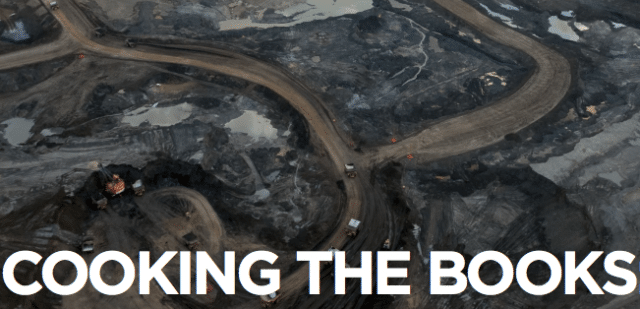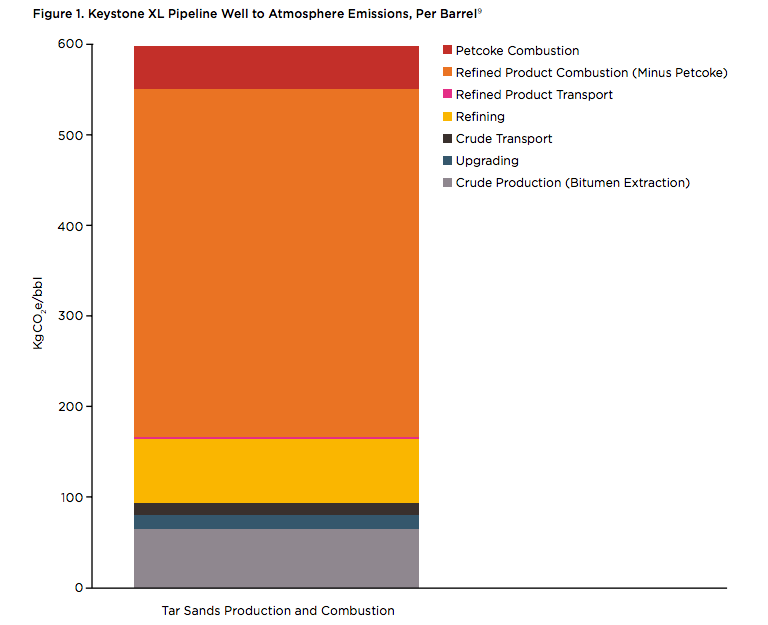This is a guest post by Caroline Selle
A new report from Oil Change International, provides new evidence that, if built, the Keystone XL pipeline will have a devastating impact on the global climate.
The major findings of Cooking the Books: How the State Department Analysis Ignores The True Climate Impact of the Keystone XL Pipeline include:
• If constructed and operated as planned, the Keystone XL will “carry and emit at least 181 million metric tons of carbon dioxide equivalent (CO2e) each year.”
• The Keystone XL would result in emissions of 6.34 billion metric tons of CO2e between 2015 and 2050.
To put those numbers in context, here are some additional figures. 181 million metric tons of CO2 is equivalent to the tailpipe emissions of more than 37.7 million cars. It’s also the equivalent of half of Spain’s total CO2 emissions for 2008, when Spain was the 19th highest emitting country in the world.
6.34 billion metric tons of CO2 is greater than the 2011 total annual carbon dioxide emissions of the United States. It’s also greater than the 2008 CO2 emissions of Russia, India, Japan, Canada, and Germany combined.
In the midst of the new revelations, the U.S. State Department continues to assert that, “the proposed Project is unlikely to have a substantial impact on the rate of development in the oil sands, or on the amount of heavy crude refined in the Gulf Coast area.” However, the Obama administration has been implicated in several conflicts of interest around the Keystone XL pipeline project, including allowing TransCanada (the project owner) to hire a controversial contractor to write the Department’s Draft Supplemental Environmental Impact Statement.
Analysis of the March 1st Supplemental Environmental Impact Statement (SEIS) only gives substance to the claims of bias. As the Oil Change International report points out, the State Department assumes whether or not the Keystone XL is built, “the oil will be burned anyway in a business as usual scenario regarding oil demand, and in the case of petcoke, coal demand. The oil or coal will be burned anyway, the thinking goes, because demand projections tell us that it will.”
In other words, the SEIS does not take into account any emissions above the “norm.” However, the report explains, “Activists, oil industry executives, Canadian government officials and financial analysts are all saying the same thing – if the Keystone XL pipeline is rejected, it will limit the growth of the tar sands.”
Contrary to the State Department’s assertions, the construction of the Keystone XL will have a substantial impact on emissions. It will also impact Alberta’s boreal forests and communities around Texas refineries where the bitumen will be shipped.
In a lovely twist, the State Department’s assessment does include a lengthy section on what climate change would do to the pipeline project. The assessment reassures project planners that “climate conditions during the 1- to 2-year construction period would not be expected to differ much from current conditions, even under worst-case modeling scenarios.” The assessment also claims that “Keystone has confirmed that the proposed Project is designed…to accommodate an increased number of hot days or consecutive hot days,” as well as “increased precipitation,” “increased drought,” the effects of soil contraction and expansion, and the impacts associated with wildfires.
In its 2012 World Energy Outlook, the IEA suggests that if meaningful climate policy is pursued, U.S. oil demand would have to be cut 50 percent by 2035 and 70 percent by 2050 based on a 2012 baseline.
Clearly, any project that produces the emissions equivalent of several countries or millions of cars is not conducive to reducing emissions avoiding the catastrophic impacts of climate change.
The public comment period on the Keystone XL SEIS expires on April 22, Earth Day. Comments can be sent to [email protected]
Subscribe to our newsletter
Stay up to date with DeSmog news and alerts








